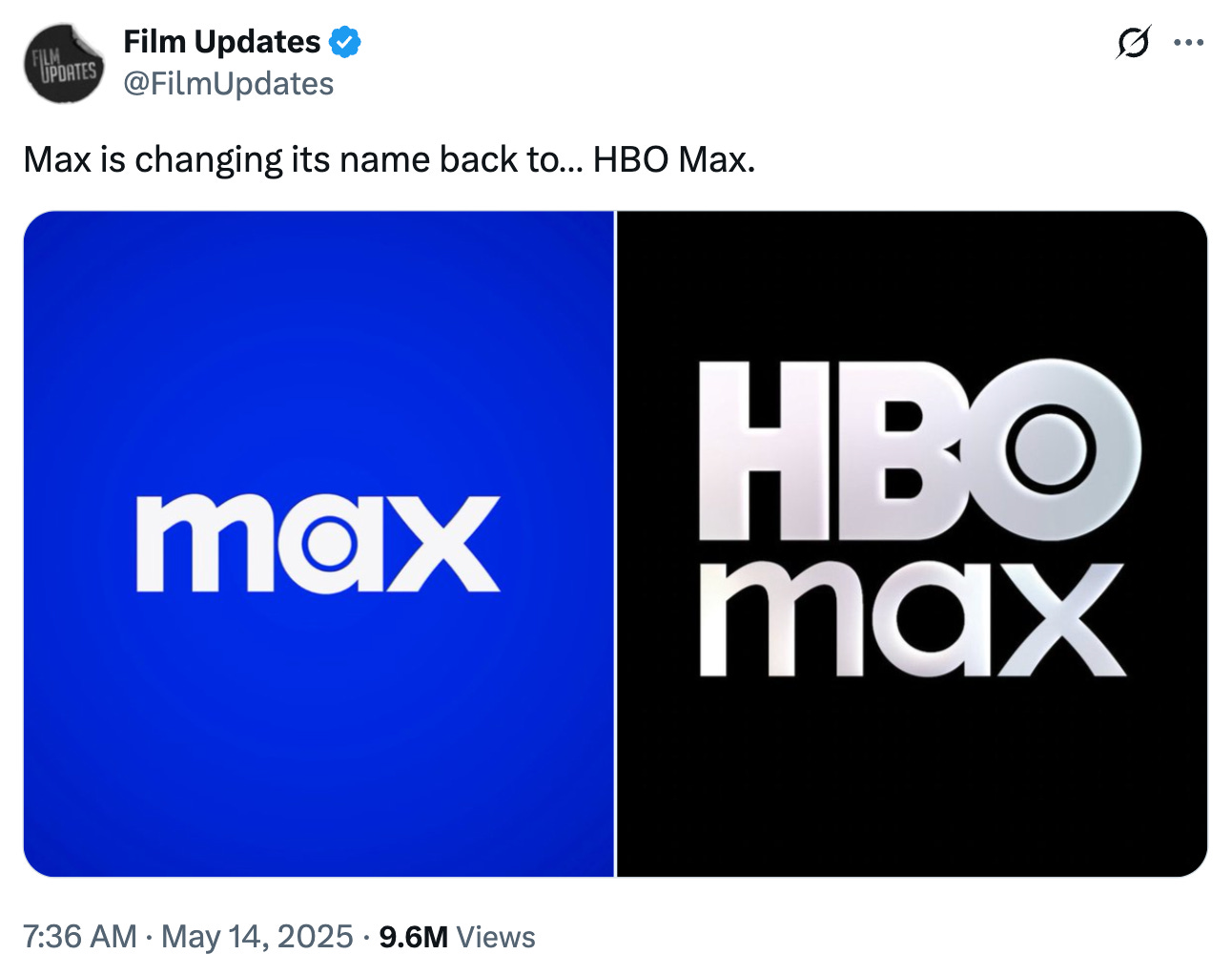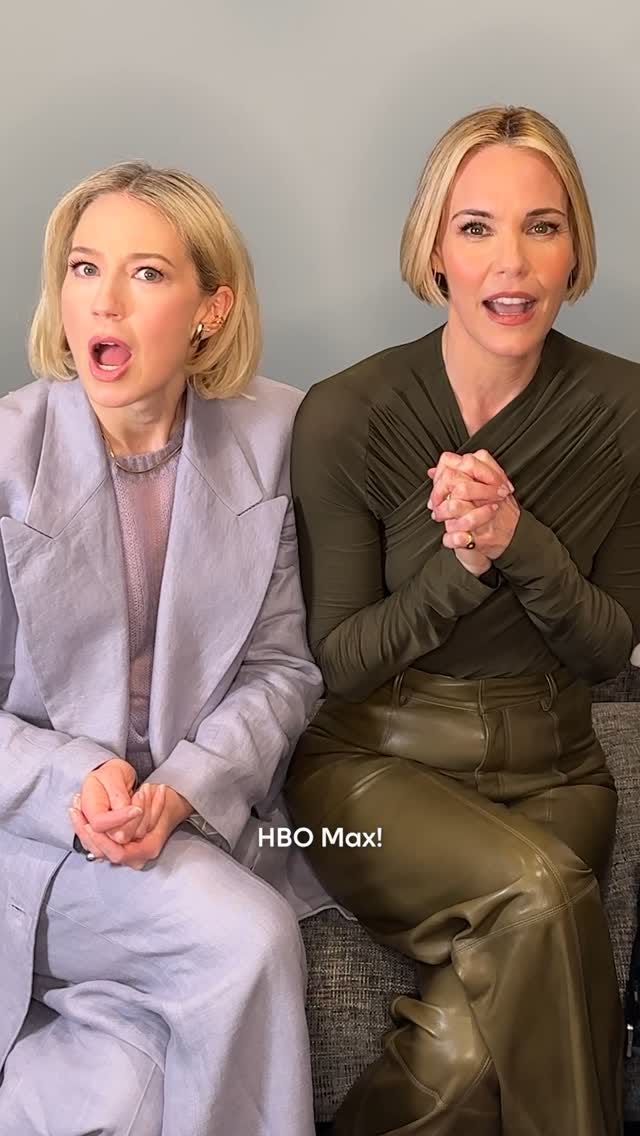Welcome to Gen Z Translator, where I break down trending topics on Fridays. If you’re new, you can subscribe here and follow me on Instagram. Views are my own. Happy reading!
I was quickly among the haters two years ago when HBO Max decided to rebrand to Max, decrying it as yet another unnecessary and irrelevant PR move. After all, what is a brand without its recognition?
“[Warner Bros. Discovery]’s naming flip-flopping for its flagship streaming service — which has caused more than a little confusion among consumers — amounts to an admission by the company it can’t be as broad as the industry leader, Netflix. The original justification for dropping HBO from HBO Max was to signal a something-for-everyone content cornucopia,” Jennifer Maas wrote for Variety.
“Of course it should be HBO! We all know what HBO is!” Wes Davis wrote for The Verge.
Whether this was the most important point or not, I thought it was stupid mainly because Max is a name, and wouldn’t it be strange to have a conversation with someone only to find out they’re talking about a streaming service while you’re talking about a person? Anyway, I digress.
The move was made, and I tried to adjust my language as such. It was much easier to reframe my Google search of “HBO Max” into “Max” than it was to re-program “Twitter” to “X,” but regardless, I still found my webpages rerouted as I inevitably typed in the wrong URL.
Now, Max is rebranding back to HBO Max.
“Warner Bros. Discovery is hopping aboard the meme train following its recent announcement that its streaming app, Max, will be returning to its previous name, HBO Max, sometime this summer,” Emlyn Travis wrote for Entertainment Weekly. “HBO's social media handles quickly began poking fun at the new (old?) name change using an arsenal of hilarious screenshots, videos, and gifs.”
Ahhh, HBO! How clever! You might think I’m being snarky here, and I am. Like, 80% of the way. The other 20% of me is saying, Ahhh, HBO. How clever, and meaning it. Turning potentially “negative” news that could reflect poorly on your company (or at least, be a little embarrassing) into promotion of not only your content, but your entire brand, is genius. It’s exactly what marketing professors would point to on their powerpoint presentation and say, “Take notes, kids.”
It’s a reminder of an expression I think about a lot in regards to the social media world: “Any engagement is good engagement.”
This isn’t the first time I’ve brought attention to the saying, and it won’t be the last. We said it often as staffers as my college newspaper. I attribute this quote to former Diamondback Editor-in-Chief Ryan Romano. (Hope you’re doing well, Ryan, have fun at the Nats game!)
The saying it originates from is, “Any publicity is good publicity,” which according to Cambridge Dictionary, “is said to emphasize that it is better that something receives bad publicity than no publicity at all.” Let’s define engagement for a moment, too. According to Hootsuite, “Social media engagement is a measure of all interactions with your social media content. Popular types of engagement include likes, comments, and shares.”
Hence, how we arrive at “Any engagement is good engagement.” Any attention a brand can get is good attention, because ultimately people are also drawing closer to the “product,” whether that’s a streaming service or something less concrete, like a brand voice.
This is what makes “rage-bait” so effective – it’s social media content meant to incite someone to an emotional reaction, whether that’s to comment in protest or share the post with their friends to make fun of it. That’s still a comment, and that’s still a share, which is still….”good” engagement. If someone is coming to your post or article to hate on it, they’re still inadvertently bringing you views or link clicks from an analytics standpoint.
“Any engagement is good engagement” is a bit tongue-in-cheek. Because of course there’s “bad” engagement. No brand wants their comment section to be filled with scorn and disdain. From an overall brand loyalty standpoint, scandals are damaging to reputation and therefore, product sales. But from a social media standpoint? Scandals are great for drawing in engagement as people going searching to confirm their own claims. (Any publicity is….say it with me….)
If HBO had wanted to push their name change under the rug, maybe they would’ve ended up drawing ire or ridicule for their lack of transparency. It’s like the Streisand Effect I talked about the other week, where the more you try to hide something, the more likely you are to draw attention to it. By getting in front of the noise, HBO not only harnessed the public reaction on their terms, but made the whole fiasco enjoyable.
I mean, look at these headlines. They’re great:
The streaming platform Max is getting a new name: its old name, HBO Max,” NPR
“Max has a new name. Again,” CNN
“Yes, it's called HBO Max again,” NBC News
“Max is becoming HBO Max again,” Morning Brew
“The social media team at Warner Bros. Discovery clearly knew the internet would have field day with the news of the reversion of the streamer’s name to HBO Max — and tried to get in front of memes about the switcheroo,” Jennifer Maas wrote for Variety.
HBO tied some of their hit shows into the meme, like The White Lotus, Euphoria, and Girls, which gives those shows renewed exposure to the public. The orchestrators of this marketing move made sure the engagement the brand received would benefit their product – a subscription-based service where you can watch shows like The White Lotus, Euphoria, and Girls.
We can complain all we want about how stupid changing “HBO Max” to “Max” and then back again was, but the move itself has been overshadowed by the company’s delivery of it. It’s a fine example of spinning a potentially negative public reaction into a positive one.
So, let me know in the comments: Is any engagement good engagement?
Read my last story: "Main character syndrome" is exhausting. Here's why
My weekly roundup:
🎶 What I’m Listening To: The Great Impersonator by Halsey
🎞️ What I’m Watching: Survivor
🔎 What I’m Reading: “The Golden Raven” by Nora Sakavic
📱 What I’m Scrolling: Does the “return of the Tumblr girl” indicate a recession?







